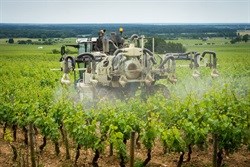
The farms comprise of 450ha of oranges and lemons, a stud herd of Bonsmara cattle, 150ha under lucerne, a facility housing 650,000 broiler chickens, and game farming. In addition to this, a convention facility is being developed for tourism.
"The Venters do three key things that we feel are essential to successful farming," says Standard Bank's head of Agribusiness, Nico Groenewald. "They pay attention to detail, even to measuring the amount of moisture in the soil of their citrus orchards to minimise water usage and ensure the quality of the fruit. This also serves to extend the life of and, therefore, extend their investment in the trees."
"Second to this, they learn from others. Before establishing their chicken broiler business, Nico Venter toured the country, studying best practice on other farms. Thirdly, the Venters innovate and diversify constantly. They are always looking for opportunities to do more farming with fewer resources. In the process, they have grown the business exponentially," says Groenewald.
"We try to ensure that every component of our operations supports and enhances the others thereby keeping the overall operation sustainable," says Boeram Venter. "For instance, the chicken litter is converted into compost for use in the citrus orchards and on the cattle grazing fields. This also enables us to reduce the use of chemical fertilisers. By the same token, any citrus that cannot be sold is fed to the cattle, along with lucerne that has been spoiled by rain."
The Venters also introduced the broilers to bridge the cash flow gap created by the citrus off-season. Further to this, the cattle act as a buffer against shifts in the citrus market, while also helping to rehabilitate land through the kikuyu that are planted for them to graze on.
From the outset, Venter chose to plant citrus in blocks of 50ha rather than the conventional 2ha. This provides the operation with economies of scale that significantly reduce the costs and increase the efficiencies of planting, irrigating, and maintaining the trees and picking the fruit. When he noticed that the trees did better in alkaline soil, he moved his operations, via acquisition of other farms, to an area that offered the means to increase his yield.
Because the Venters believe that you can't manage what you can't measure, they collect and analyse data about every aspect of the business. By computerising the monitoring of their orchard soil, they can apply precision irrigation. Computerised temperature control and precision feeding, closed circuit television, electronic scales, and automated disinfectant spraying of delivery trucks enables the broiler facility to be operated hygienically.
Venter was one of the first farmers in the Addo area to offer his employees equity in his operations. He sold 75% of one of his farms to 23 of his farm workers, mentoring them for the next five years, and only selling his 25% share to them once he was certain they could operate profitably on their own. The Venter operation presently has 82 permanent employees and 300 seasonal workers.